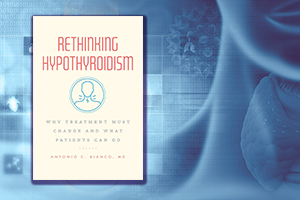



| By Dr. Ronald Hoffman

Members of the natural health movement (myself included) have long argued that despite acknowledged medical advances, today’s proliferation of pharmaceutical drugs threatens to undermine, rather than promote, the health of our populace. We’re often branded as Luddites, ignorant skeptics, even quacks.
So, this month, I was blown away by a scholarly article that seems precisely to support our assertion!
Entitled “Does Medical Expansion Improve Population Health?”, it was published in Journal of Health and Social Behavior.
Its authors, Hui Zheng and Linda K. George, are mainstream researchers, not known as firebrands of the integrative health community.
In their sober, academic prose they declare: “This is the first study to examine the relationship between multiple measures of socioeconomic development and medical expansion and multiple measures of mortality/longevity, using data from a sizable number of countries . . .”
The key question they address is whether or not the soaring medicalization of advanced nations has brought with it improvements in established metrics of health for their citizens.
“The Western world has observed skyrocketing healthcare costs, explosive growth in the number of hospitals and health facilities, a burgeoning and increasingly specialized medical workforce, expansion of the pharmaceutical industry, and the extension of medical treatments to non-medical problems.” To cite but a few examples, think age-related bone loss (osteopenia), “overactive bladder” (OAB), shyness (now called “social phobia”), menopause, and erectile dysfunction (ED)—all amenable to heavily-marketed new drugs.
Zheng and George point out that it’s been argued that medical expenditures do not necessarily guarantee better outcomes. The U.S. is a case in point.
Total health care expenses as a percentage of its gross domestic product (GDP) in the U.S. skyrocketed from 5.1% in 1960 to 17.8% in 2016. During the same time period, the number of Americans employed in health-related fields expanded four-fold.
Other countries’ spending ranged from a low of 9.6% of GDP in Australia to a high of 12.4% of GDP in Switzerland. Like the U.S., most advanced countries have seen around a three-fold increase in the number of doctors.
At the same time, the U.S. spent an average of $1,443 per person on drugs, compared with an average of $749 per person across all of the countries in the study.
While the U.S. showed the highest spending, it scored lowest among 10 other high-income countries in terms of life expectancy at 78.8 years. The other countries ranged from 80.7-83.9 years.
So Zheng and George sought to determine why increased medical spending did not translate into a corresponding boon in health.
They considered several possibilities: Did the increase in the number and specialization of health professionals result in fragmented, depersonalized care? Did advanced medical techniques not pay off in terms of better outcomes? Was medical progress retarded by socioeconomic factors, like poverty? Were the benefits of new drugs outweighed by their adverse effects?
They then crunched the numbers and did a rigorous analysis. It truly was a monumental effort, involving advanced statistical techniques at the forefront of social science.
One of their conclusions was not particularly surprising: Contrary to what some skeptics allege—that progress in health and longevity in Westernized countries is due mostly to improvements in sanitation and living conditions rather than high-tech breakthroughs in care—the study affirmed that medical advances delivered tangible benefits.
But here’s the real kicker: Zheng and George concluded that the expansion of the pharmaceutical sector has “compromised the beneficial effect of medical specialization.” That’s quite an admission for a pair of staid medical sociologists!
Why does an over-sized pharmaceutical industry have detrimental effects on population health? Zheng and George admit to not understanding precisely why this might be so, but they speculate that at least three factors might be involved:
They add that there’s evidence that marketplace flooding with illicit prescription drugs (especially opioids) is contributing to premature deaths, especially in the U.S. where longevity has actually declined during the past couple of years, especially among white American males in the Rust Belt, bucking a century-long trend toward increased average lifespans.
“This study isn’t the first to suggest prescription drugs can pose a health risk. But it is the first to find that the growth of the pharmaceutical industry itself may be associated with worse rather than better health [emphasis added],” said Zheng.
“We found that as the pharmaceutical industry expands, there is a decrease in the beneficial impact of medical specialization on population health,” he said.
The study claims that there’s a “trend for pharmaceutical companies to develop large numbers of new drugs with few clinical advantages over existing ones, rather than tackling diseases for which existing drugs are absent or of limited effectiveness. The medical professions also have become more commercialized. For example, pharmaceutical companies increasingly urge clinicians to prescribe drugs for conditions other than those for which they are approved and promote off-label or unapproved uses.”
The problem is compounded because the profit margins for prescription drugs are, on the whole, far greater in the U.S. than in other comparable countries worldwide, a powerful impetus to over-prescribing. Drugs are heavily marketed to U.S. physicians. Further fueling consumption, the U.S. is one of only two countries (along with New Zealand) to permit direct-to-consumer (DTC) drug ads. The U.S. also fast-tracks development and approval of more drugs than other advanced countries.
I see the Zheng/George study as a clarion call for re-evaluation of our approach to health care. What this country—along with advanced countries world-wide—needs is not so much a health care deliverysystem, but rather a true health system, an initiative predicated on deprescribing in favor of fundamental lifestyle interventions. We need a shift in the nexus of health care, from the hospital and the clinic, to the community and the home.
The elephant in the room is America’s—and only to a somewhat lesser extent the world’s—inexorably rising obesity rate. Sedentary lifestyle, demoralization, stress, and a toxic food environment are key factors that need to be addressed if we’re going to counteract the tendency to default to pharmaceutical solutions for diseases of excess.
It’s unlikely that the drug industry will ever be constrained by government regulations. In the wake of the Zheng/George study, medical consumers and supportive health professionals need to “vote with their feet” to eschew medication quick-fixes that do more to undermine, rather than promote, their health and longevity.
In essence, society doesn’t need more medicine; it needs more Intelligent Medicine.
Though we think of declining estrogen as the hallmark of menopause, it's actually common for…

Up to 12 percent of Americans have ulcers at some point in life. Peptic ulcers…
Gallbladder disease is a modern illness. An estimated 20 million Americans have gallbladder disease. The…

We’re living longer, but cognitive decline threatens to rob us of quality of life in…

Dr. Antonio Bianco, recipient of the American Thyroid Association’s John B. Stanbury Thyroid Pathophysiology Medal,…

There’s a misconception among low-carb dieters. Many people believe a low-carb diet is much higher…

Leyla Weighs In: Eating for Energy and Emotional Well-Being

Our virtual voicemail is open 24/7, so there's no need to wait to submit your questions for Dr. Hoffman. Leave a message, and you may hear your question featured on the Intelligent Medicine radio program!